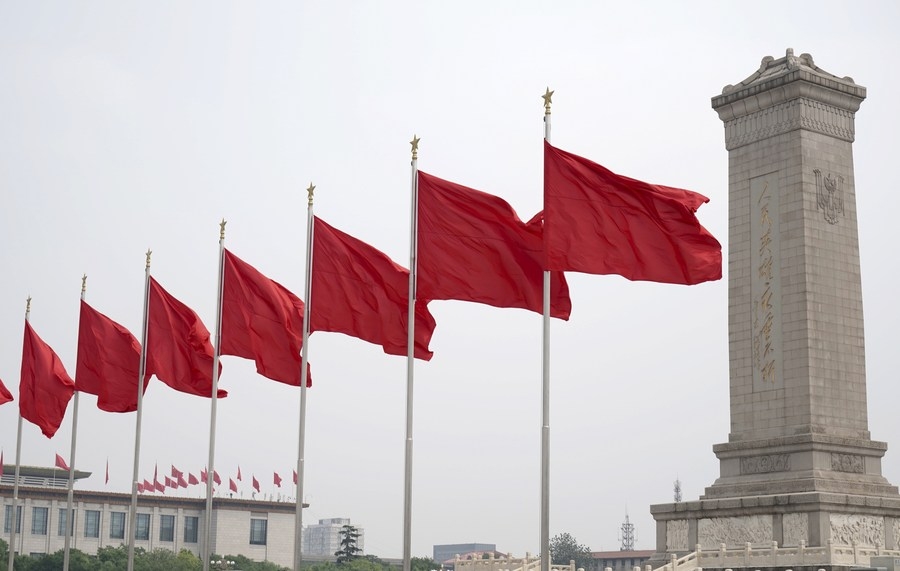The House of Commons Intelligence and Security Committee has called for tougher action in the government’s “robust” and “clear-eyed” approach to China…reports Asian Lite News
China’s size and ambition has enabled it to successfully penetrate every sector of the UK’s economy, an influential parliamentary panel has said, warning that Beijing’s national imperative continues to become a technological and economic superpower on which other countries are reliant, which represents the “greatest risk” to the UK.
The House of Commons Intelligence and Security Committee (ISC) said in a wide-ranging report released that the intelligence threat posed by China is compounded by a “whole-of-state” approach with the use of state and non-state players for spying.
China’s national imperative continues to be the dominance and governance of the Chinese Communist Party (CCP) and at a global level, to become a technological and economic superpower on which other countries are reliant, which represents the “greatest risk” to the UK, it said.
It cautioned that the level of resources dedicated by the UK to tackling the threat posed by China’s so-called “whole-of-state” approach has been “completely inadequate”.
“China almost certainly maintains the largest state intelligence apparatus in the world – dwarfing the UK’s Intelligence Community and presenting a challenge for our agencies to cover,” the report notes.
“As a result, our agencies’ work has to be targeted on those aspects that are most damaging. However, the problem is compounded by China’s ‘whole-of-state’ approach,” it said.

“In practice, this means that Chinese state-owned and non-state-owned companies, as well as academic and cultural establishments and ordinary Chinese citizens, are liable to be (willingly or unwillingly) co-opted into espionage and interference operations overseas: much of the impact that China has on national security is overt – through its economic might, its takeovers and mergers, its interaction with Academia and Industry – as opposed to the covert activity carried out by its intelligence officers,” it said.
The ISC review is critical of the UK government approach, which until the pandemic readily accepted Chinese investments.
“China’s size, ambition and capability have enabled it to successfully penetrate every sector of the UK’s economy, and – until the Covid-19 pandemic – Chinese money was readily accepted by HMG [His Majesty’s Government] with few questions asked,” it said.
“China’s ruthless targeting is not just economic: it is similarly aggressive in its interference activities, which it operates to advance its own interests, values and narrative at the expense of those of the West,” it adds.
The ISC called for tougher action in the government’s “robust” and “clear-eyed” approach to China, as it found that external experts believe it was singularly failing to deploy a whole-of-government approach when countering the threat from China – “a damning appraisal indeed”.
“If the Government is serious about tackling the threat from China, then it needs to ensure that it has its house in order such that security concerns are not constantly trumped by economic interest,” the ISC said.
Earlier this week, Australian lawmakers were told that networks of fake Facebook accounts run from China were “evolving” and adopting new tactics to sow discord overseas.
Last year, Britain’s domestic intelligence agency MI5 warned that a Chinese spy had infiltrated parliament to interfere in UK politics.
This week, British media reported fears that a Chinese spy tried to infiltrate a meeting involving lawmakers and Hong Kong dissidents.
The ISC report highlighted China’s “whole-of-state” approach as a particular problem for the UK, whose government has been under pressure to take a tougher stance against Beijing.
Despite disagreements over issues such as rights in Hong Kong and the treatment of Uyghur Muslims, London instead argues that Western countries should work in partnership with the Asian superpower.
The report stated: “Chinese state-owned and non-state-owned companies, as well as academic and cultural establishments and ordinary Chinese citizens, are liable to be (willingly or unwillingly) co-opted into espionage and interference operations overseas.”
Much of China’s impact on the UK’s national security had been overt, by leveraging its economic might, by takeovers and mergers and through its interactions with academia.
“China’s size, ambition and capability have enabled it to successfully penetrate every sector of the UK’s economy,” said the report.
While some of its attempts to exert influence were legitimate, the ISC accused China of “overstepping the boundary”. “It has been particularly effective at using its money and influence to penetrate or buy academia in order to ensure its international narrative is advanced and criticism suppressed,” it warned.
Beijing’s efforts to shape international narratives could be seen in its response to the pandemic, where it “sowed seeds of doubt about the origins of the virus and greatly exaggerating its work to counter it,” it added.
The committee, which oversees the UK intelligence community, called on the government to take more coordinated action against the threat.
“The level of resource dedicated to tackling the threat posed by China’s whole-of-state approach has been completely inadequate,” it added.
Britain’s National Security Act became law just days ago, introducing for the first time an offence of foreign interference, meaning it will now be illegal to engage in conduct that interferes with fundamental rights, such as voting and freedom of speech, that are deemed essential to the UK’s democracy.
A ban was also announced three years ago on Chinese telecoms giant Huawei from the UK’s 5G mobile networks, amid fears over potential spying “backdoors”, which the company strongly denied.
Chinese-owned social media app TikTok was banned on UK government electronic devices in March this year, a move similar to restrictions imposed by the US, Canada and the European Commission.
The Westminister Parliament has also banned TikTok from its network over security concerns. The steps have been criticised by the social media giant.
Security minister Tom Tugendhat also told the Commons in June of alleged secret “Chinese police service stations” in Croydon, Hendon and Glasgow, which were reportedly used to monitor Chinese citizens in the UK.
ALSO READ-Albanese, Sunak take hilarious jab at rival Ashes teams

